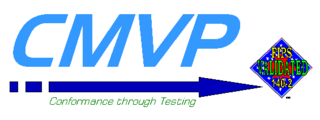The Common Criteria for Information Technology Security Evaluation is an international standard for computer security certification. It is currently in version 3.1 revision 5.
The Federal Information Processing Standard (FIPS) Publication 140-2,, is a U.S. government computer security standard used to approve cryptographic modules. The title is Security Requirements for Cryptographic Modules. Initial publication was on May 25, 2001 and was last updated December 3, 2002.

The Cryptographic Module Validation Program (CMVP) is a joint American and Canadian security accreditation program for cryptographic modules. The program is available to any vendors who seek to have their products certified for use by the U.S. Government and regulated industries that collect, store, transfer, share and disseminate "sensitive, but not classified" information. All of the tests under the CMVP are handled by third-party laboratories that are accredited as Cryptographic Module Testing Laboratories by the National Voluntary Laboratory Accreditation Program (NVLAP). Product certifications under the CMVP are performed in accordance with the requirements of FIPS 140-2.
A Medical Assistant, also known as a "Clinical Assistant" or healthcare assistant in the UK is an allied health professional who supports the work of physicians and other health professionals, usually in a clinic setting. Medical assistants can become certified through an accredited program. Medical Assistants perform routine tasks and procedures in a medical clinic.
Accreditation is the process in which certification of competency, authority, or credibility is presented.
Product certification or product qualification is the process of certifying that a certain product has passed performance tests and quality assurance tests, and meets qualification criteria stipulated in contracts, regulations, or specifications.
ISO/IEC 17025 General requirements for the competence of testing and calibration laboratories is the main ISO standard used by testing and calibration laboratories. In most countries, ISO/IEC 17025 is the standard for which most labs must hold accreditation in order to be deemed technically competent. In many cases, suppliers and regulatory authorities will not accept test or calibration results from a lab that is not accredited. Originally known as ISO/IEC Guide 25, ISO/IEC 17025 was initially issued by the International Organization for Standardization in 1999. There are many commonalities with the ISO 9000 standard, but ISO/IEC 17025 is more specific in requirements for competence and applies directly to those organizations that produce testing and calibration results and is based on somewhat more technical principles.. Laboratories use ISO/IEC 17025 to implement a quality system aimed at improving their ability to consistently produce valid results. It is also the basis for accreditation from an accreditation body.
Listing and approval use and compliance is the activity of adhering to specific testing requirements designed to establish minimum performance for the installation or use of safety-related products and materials in conformance with an active certification listing or approval that has been issued by an organization that is accredited both for testing and product certification, such as those issued by Underwriters Laboratories, NTA Inc, FM Global, American Nuclear Insurers, or the Deutsches Institut für Bautechnik (DIBt). In concept, if a product, such as a fire door, fire extinguisher, or toaster, is used in the intended manner, the component or system will perform as described in the listing and/or approval. The listing or test is often cited by a regulation, such as a building code or a fire code, and becomes enforcable through adopted codes or regulations. This concept is known as bounding in the nuclear industry. Products whose use is not mandated by any building codes or fire codes often lack a consensus test method. Unless there is a test standard in existence to prove the functionality and reliability of such a product, there can be no certification listing. Many authorities are charged to review and approve results from qualified testing agencies, when for the purpose intended, the evidence shows compliance for a material, product or construction method that provides equivalent strength, quality, fire resistance, durability and safety when evaluated through general engineering practices.
National Voluntary Laboratory Accreditation Program (NVLAP) is a National Institute of Standards and Technology (NIST) program in the USA which provides an unbiased third-party test and evaluation program to accredit laboratories in their respective fields to the ISO 17025 standard. NVLAP is in compliance with ISO 17011.
The Air Movement and Control Association International, Inc. (AMCA) is a long-established American trade body that sets standards for Heating, Ventilation and Air Conditioning (HVAC) equipment. It is best known for its ratings in fan balance and vibration, aerodynamic performance, air density, speed and efficiency.
The Clinical and Laboratory Standards Institute (CLSI) is a volunteer-driven, membership-supported, not-for-profit, standards development organization. CLSI promotes the development and use of voluntary laboratory consensus standards and guidelines within the health care community. The organization’s mission is to develop clinical and laboratory practices and promote their use worldwide.
Certification and accreditation is a process for implementing any formal process. It is a systematic procedure for evaluating, describing, testing, and authorizing systems or activities prior to or after a system is in operation. The process is used extensively across the world.

The Bureau of Indian Standards (BIS) is the national Standards Body of India working under the aegis of Ministry of Consumer Affairs, Food & Public Distribution, Government of India. It is established by the Bureau of Indian Standards Act, 1986 which came into effect on 23 December 1986. The Minister in charge of the Ministry or Department having administrative control of the BIS is the ex-officio President of the BIS.
Control system security is the prevention of interference with the proper operation of industrial automation and control systems. These control systems manage essential services including electricity, petroleum production, water, transportation, manufacturing, and communications. They rely on computers, networks, operating systems, applications, and programmable controllers, each of which could contain security vulnerabilities. The 2010 discovery of the Stuxnet worm demonstrated the vulnerability of these systems to cyber incidents. The United States and other governments have passed cyber-security regulations requiring enhanced protection for control systems operating critical infrastructure.

In metrology, a standard is an object, system, or experiment that bears a defined relationship to a unit of measurement of a physical quantity. Standards are the fundamental reference for a system of weights and measures, against which all other measuring devices are compared. Historical standards for length, volume, and mass were defined by many different authorities, which resulted in confusion and inaccuracy of measurements. Modern measurements are defined in relationship to internationally standardized reference objects, which are used under carefully controlled laboratory conditions to define the units of length, mass, electrical potential, and other physical quantities.

NSF International is an American product testing, inspection and certification organization based in Ann Arbor, Michigan.

National Accreditation Board for Testing and Calibration Laboratories (NABL).




